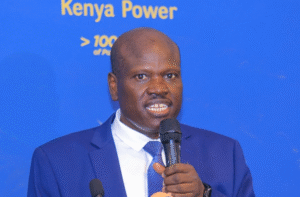Share
The National Assembly’s Public Investments Committee on Commercial Affairs and Energy (PIC-CAE) on Tuesday, October 14, grilled top management of the Kenya Power and Lighting Company (KPLC) over shocking audit questions that reveal the existence of deep-rooted financial malpractices, lapses in government, and procurement defiance that threaten the company’s stability.
The Committee, Chaired by Pokot South MP David Pkosing the Committee questioned the company’s financial statements for the year ending June 2022, which revealed a troubling pattern of poor fiscal performance.
The Auditor-General’s report indicated that KPLC’s current liabilities exceeded its current assets by Ksh55.7 billion, marking the sixth consecutive year of negative working capital, which is a clear indication of liquidity issues.
“This situation poses a threat to the company’s ability to continue operating as a going concern,” the Auditor-General warned.
The audit revealed unapproved secondments of 36 staff from various ministries and agencies, and a delay in appointing a substantive Managing Director despite the recruitment process being completed.
It also found that over 2,600 employees took home less than a third of their basic pay, a violation of the Employment Act (2007).
Committee Question Costly Power Deals
Equally alarming was the disparity in the cost of power supplied by different producers.
The audit showed that while KenGen provided 63% of electricity at Ksh38.9 billion, Independent Power Producers (IPPs) supplied the remaining 37% at a higher cost of Kshs.56.2 billion.
This means each unit from IPPs costs nearly three times more than that from KenGen , a revelation that led to the MPs seeking to understand what happened to the costly agreements that were taking a toll on Kenyan consumers.
Kenya Power Fuel Costs and Procurement Anomalies
The Committee also raised concern over a 137% increase in fuel costs and questionable procurement practices, including the direct hiring of generators for Mandera and Lodwar stations at Ksh185 million without open tendering.
KPLC management defended the move, citing urgency and security challenges in the affected regions.
Additionally, the Auditor-General flagged insurance contracts exceeding approved budgets and consultancy engagements that violated tender regulations.
KPLC Defends Its Position
Appearing before the Committee, KPLC CEO Dr. Joseph Siror said the company had implemented corrective measures, including enhanced reconciliation of inter-agency accounts with KenGen, KETRACO, and REREC, and introduced stricter procurement oversight mechanisms to curb irregularities.
Pkosing acknowledged the company’s recent efforts to address past issues but said many audit findings remain unresolved.
“Despite improvements, Kenyans continue to suffer from unreliable and costly electricity. The company must urgently implement lasting reforms,” he said.
Unlawful Board Meetings and Accountability Requirements
Pkosing further condemned revelations that KPLC’s board held 62 illegal meetings, stating, “Those who participated must refund the money they received. Accountability must apply to every public officer regardless of rank.”
Duncan Mathenge (Nyeri Town MP) said if the issues raised are not resolved satisfactorily, the committee will recommend that board members personally refund any irregular payments.
He described some meetings as “illegal and unethical,” citing serious conflicts of interest.
Mwangi Kiunjuri (Laikipia East MP) added, “It is unacceptable for an organization of KPLC’s stature to hold irregular board meetings that amount to a conflict of interest.”
He urged firm action to prevent similar practices by Cabinet Secretaries and Principal Secretaries in future.
Committee to Summon Cabinet Secretaries
Dr. Siror requested more time to provide additional documentation addressing the Committee’s concerns.
Pkosing announced that the Committee will summon Energy Cabinet Secretary Opiyo Wandayi and National Treasury CS John Mbadi to respond to audit questions touching on policy and financial oversight.
MPs Demand Low Power Costs
Committee members expressed deep concern over the rising cost of electricity, saying it continues to weigh heavily on Kenyan households still grappling with unreliable power supply.
“The Committee will not allow inefficiency and policy loopholes to continue burdening Kenyans through inflated power costs,” said Pkosing, as Parliament will ensure that transparency and accountability are upheld in all state corporations.

Kenya Power CEO Dr Joseph Siror
PHOTO/X
You Might also Like








